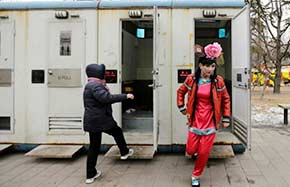China's booming Airbnb-style industry faces tougher regulation
 |
|
A room for short-term home rental is ready to welcome customers in Ningbo, East China's Zhejiang province, December 24, 2016. [Photo/VCG] |
After tighter regulations on car-hailing apps, regulators are making the Airbnb-style homestay business their latest booming internet-related target.
Zhejiang province in East China became the first provincial government to rein in the burgeoning industry, which will be worth an estimated 100 million yuan ($14.4 million) in 2017 according to a report by consulting firm iResearch.
The coastal province, home to China's internet magnet Alibaba and known for its entrepreneurial environment, will restrict the size of houses that are used in the Airbnb-style business and raise security standards.
A four-story, 15-room and 800-square meter house is the maximum size that can be used for a homestay, according to the new measure that will take effect next month.
Popular home-sharing network Airbnb has been taking customers from hotels globally by connecting landlords of affordable short-stay housing to vacationers who can then mingle with locals, a perk they seldom get in hotels.
The Chinese version, Tujia, is also riding on the same momentum, mainly catering to customers in China. In summer it bought the short-term home rental site Mayi.com. In October Tujia consolidated its status by reaching an agreement with Ctrip and Qunar to merge the vacation home rental businesses of the two Chinese online travel services.
The way this ineligible market attracted attention of regulators was reminiscent of car-hailing apps. In October mega cities including Beijing and Shanghai downsized eligible drivers working for car-hailing apps to locals whose cars have locally registered plates.
Fast-growing, tech-savvy clientele eschew traditional businesses, which could eventually lead to a revolution by making the old industry smart and internet-connected.
- Tears and smiles: Ordinary lives of Chinese people in 2016
- Two dead in Wednesday's terrorist attack in Xinjiang: police
- Chinese UN peacekeepers young and eager to break language barriers
- China to build more high-speed railways in five years: white paper
- China's high-speed rail on fast track in technology innovation and application

















